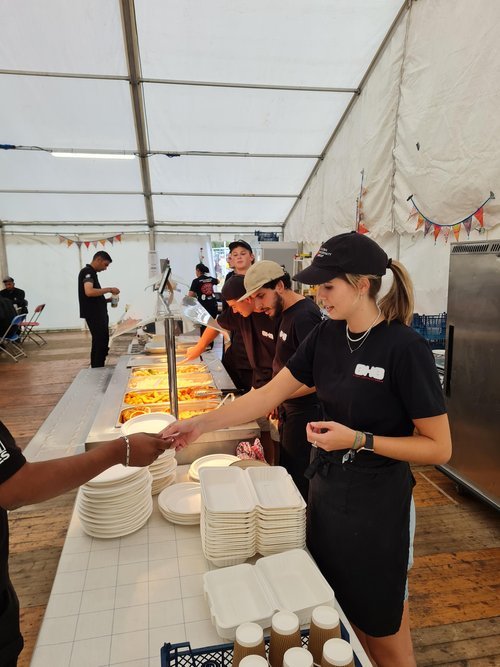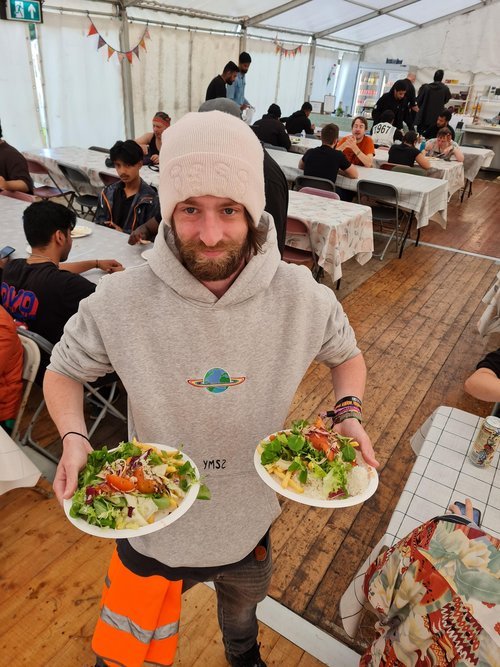Peter Wright and team meet the challenge of catering for seven UK music festivals in 99 days
/Ninety-nine days on the road, seven festivals successfully planned and delivered. The dukes of catering feeding artists, performers, medics and all support staff.
Huge thanks to the GHG staff who worked tirelessly behind the scenes and to our clients Festival Republic and FMS, big thanks for your support.
The above LinkedIn post from chef Peter Wright neatly summarises what his Global Hospitality Group team has been up to over the past few months, but only hints at the scale of such a massive undertaking. To find out just what’s involved in providing the catering for seven UK music festivals over 99 days, we spoke to Peter while he was still catching his breath upon his return to Australia!
PETER WRIGHT
Global Hospitality Group
“We started catering for UK music festival business in 2017 and picked up some momentum through 2018-19, but then the pandemic hit and shut everything down for a couple of years,” Peter says by way of filling in the background. “In 2021 we used a local caterer to assist us because we couldn’t travel, but from last year we were back on board.”
Over that time Peter and his team have gradually built up a reputation based on the comprehensiveness of their offer – feeding all back of house people involved in the festival, from production crews and security guards to volunteer workers like Oxfam and Red Cross representatives, along with medics, transport crews, plumbers, electricians, cleaning staff and more.
“We’re not only responsible for their meals but for their general wellbeing, in that everyone stays on site for the duration of the festival”
“The only meals they’re having are from us, and if they’re happy and well fed then they’ll be working at their best, and the organisers will be happy because no one’s complaining. We’ve been doing this for a number of years now and all of a sudden it’s taken off.”
Meal queues running 16 – 18 hours per day
First festival off the rank for 2023 was Download, a heavy metal festival in Nottingham, England with upwards of 100,000 attendees. “We coined the phrase will the queue ever end? Because you queue to get in, to get your accreditation, to bring your vans in, to go to the toilets, to get your meal, everything you do. And the catering numbers were so big – we started breakfast at 6.30am, that finished at 11am and people were still coming in for breakfast as we were transitioning to lunch.
“It was the same between lunch and dinner and people were still coming for meals while we were trying to close up at 10pm – it’s a continuous loop. We also had a retail outlet so the queues were running 16, 17, 18 hours a day.”
Peter worked with a core team of chefs whom he met while catering for the 2016 Brazil Olympic Games – “they’re from a catering company in Brazil and have worked for us all over the world. They’re great chefs and know how to work to a budget – as long as they have a constant supply of fresh herbs, ginger, chilli, olive oil and garlic, they can produce delicious high-volume food every day and they never seem to run out! We keep up the supply chain at our end and they keep up the food supply at the other – it's a great system
“I run the conduit between back of house and front of house – we have our own front of house staff and we also have a group we call the backpackers: somehow it seems anyone backpacking in Europe during the festival season manages to get in touch with us and works for us usually one festival – that’s enough for them, they’re exhausted by the end and go off and spend their money. So we get fresh legs every time and of course some people are keen to work a particular event because of the music.”
This brought up the question of Peter’s own musical tastes and whether he appreciates the festival acts. “I usually look at the billboard for each event and scratch my head but end up finding one or two I like! I tend to focus on the business end but the younger ones will work about 12 hours and then go off to enjoy the festival. We only have a few rules, but one is that if you have a 6am start you need to show up on time and I’ll determine whether you’re fit to work. It’s amazing how some young people can party on and somehow still sustain themselves for a whole week of work!”
The highlight of this year’s festivals for Peter was Crystal Palace Park which runs for a fortnight. “We had the kitchen in the middle, with one side feeding crew and staff and the other the artists and performers. Blondie and Iggy Pop were playing, the drummer from the Sex Pistols was in a band with Billy Idol, and I was a little bit excited because we were feeding their crews and of course they came in to eat. So we got to see them in their natural state, then later they’re out on stage and it’s all show!
“We did a feeding for all the medics – there’s a camp of 1600 medical staff to manage the health and safety of 300,000 people, there’s fleets of ambulances, even a small hospital”
“My ultimate favourite of the festivals is Glastonbury, not because it’s the most profitable or exciting as far as the food goes, but because it’s virtually a rite of passage – everyone in the world needs to go once! It’s a farm that’s been transformed into a township of 300,000, all fenced in and there’s hundreds of different stages and acts – it’s almost like a human circus. And you get headline bands and different styles of music, even juggling and face painting.
“It’s not just about music but community, and it’s not for profit so all the money made goes to benefit the community. We did a feeding for all the medics – there’s a camp of 1600 medical staff to manage the health and safety of 300,000 people, there’s fleets of ambulances, even a small hospital. I got to see Cat Stevens, who was one of our heroes growing up in the 1970s, and he was really cool so it was very much worth the effort!”
Following Download, Glastonbury and Crystal Palace, Peter and his team moved on to the London Park festival, then the Reading and Leeds festival where an extra crew was brought out from Australia.
“We were doing several thousand meals a day – it’s what you call greenfields catering, there’s nothing there when you arrive and then a tent appears and a kitchen arrives. We call it bump in-bump out in Australia and in the UK they call it build and break.”
“As we work together we build relationships and the harder you work and the more you do, the more responsive people become”
Environmental compliance a critical concern
The sheer complexity of setting up necessitates much logistical planning and problem-solving. “In a static environment you have mechanics and engineers, but here you’ve got to call on the production maintenance people who are building a site which could have 85,000 people camping on it, putting up all the stages, the lights … so it’s not actually that easy to get them to come and check out a faulty toaster. But as we work together we build relationships and the harder you work and the more you do, the more responsive people become – it ends up like a big family who are all relying on each other, and I guess that’s the thrill of it.”
“There’s no single use plastics, nothing’s bottled in plastic unless it’s recyclable”
Sustainability and environmental compliance are also critical components. “The organisers, Festival Republic are linked with Live Nation and they have a policy called Green Nation which has laid down very specific do’s and don’ts – you can’t have anything not recyclable, there’s no single use plastics, nothing’s bottled in plastic unless it’s recyclable.
“We also weren’t allowed to serve beef because their environmental framework policy regards its production as damaging to the environment.
“Food safety is always critical, and in this scenario where you’re constantly moving from one place to another, you’re dealing with a new environmental officer at every site whom you’ve never met before so you have no pre-existing relationship to draw on. Add to that the fact that the British laws are not only very strict but a little different to the Australian ones and that can be quite complex.
“The escalation of vegan and vegetarian cuisine in the UK is remarkable”
“You’re aLso feeding people who have English as their second language, plus there are certain cultural aspects that come into play. The escalation of vegan and vegetarian cuisine in the UK is remarkable – I’d estimate we were almost 30 to 40 per cent vegetarian at some festivals, and probably 50 per cent of those would have been vegan. That’s a very big transition over the five to six years we’ve been doing festivals.
“Gluten free is also very strong and that, along with allergen food safety compliance, was highlighted a lot by the environmental officers.
“Accountability for allergens is massive and when you compound all that into a temporary marquee which was set up 24 hours ago and you have to be up and running and fully compliant with everything in place as you would be in a function centre or café, it’s a big job!
That said, the sheer scale of the schedule meant Peter and his team grew steadily more proficient at tackling these logistical challenges as they went along. “Towards the end we were doing back to back festivals with closing dinner on Monday, then breakfast in another city on Wednesday, and getting very efficient with it.
“From the first event to the last, you don’t realise how far everyone’s developed – not just experience-wise but as a core group, everyone knows what their job is the moment the truck doors open.
“At the conclusion of it all we had a little party in a house just outside of London. We were all happy because it was finished but it was also a little emotional because of the bonds of kinship we’d made, almost like family relationships from working and living together on site sharing every intimate moment. So it was sad, but happy too because we know we’re going to do it again next year.”












